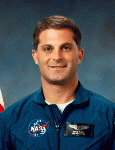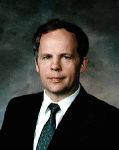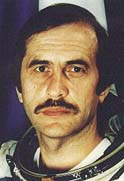
NASA-6 Biographies
| Wolf | Solovyev | Vinogradov |
 Dave
Wolf Biography
Dave
Wolf Biography
NAME: David A. Wolf (M.D.) NASA Astronaut
PERSONAL DATA: Born August 23, 1956, in Indianapolis, Indiana. Single. He enjoys sport aerobatic flying, scuba diving, handball, running, and water skiing. His parents, Dr. and Mrs. Harry Wolf, reside in Indianapolis.
EDUCATION: Graduated from North Central High School, Indianapolis, Indiana, in 1974; received a bachelor of science degree in electrical engineering from Purdue University in 1978, and a doctorate of medicine from Indiana University in 1982. He completed his medical internship (1983) at Methodist Hospital in Indianapolis, Indiana, and USAF flight surgeon primary training at Brooks Air Force Base in San Antonio, Texas.
ORGANIZATIONS: Member of the Institute of Electrical and Electronics Engineers; the Aerospace Medical Association; the Experimental Aircraft Association; the International Aerobatic Club; and the Air National Guard.
SPECIAL HONORS: Recipient of the NASA Exceptional Engineering Achievement Medal (1990); NASA Inventor of the Year, 1992. Dr. Wolf graduated "with distinction" from the honors curriculum in electrical engineering at Purdue University and received an Academic Achievement Award upon graduation from medical school. He received the Carl R. Ruddell scholarship award for research in medical ultrasonic signal and image processing. He is a member of Eta Kappa Knu and Phi Eta Sigma honorary societies. Dr. Wolf has received 11 U.S. Patents and over 20 Space Act Awards for 3-dimensional tissue engineering technologies earning the Texas State Bar Patent of the Year in 1994. He has published over 40 technical papers.
EXPERIENCE: As a research scientist at the Indianapolis Center for Advanced Research from 1980 to 1983, he developed digital signal and image processing techniques utilizing matched filter detection of high time-bandwidth product transmissions producing "state of the art" high resolution medical ultrasonic images to the 100 micron level. He also developed new doppler demodulation techniques extending the range velocity product limitation of conventional pulsed doppler systems.
He is a USAF senior flight surgeon in the Air National Guard (1982 to present) and is a member of the Board of Directors of the National Inventors Hall of Fame. He has logged over 2000 hours of flight time including air combat training as a weapons systems officer (F4 Phantom jet), T-38 Talon, and competition aerobatics (PITTS Special and Christen Eagle).
NASA EXPERIENCE: : In 1983, Dr. Wolf joined the Medical Sciences Division, Johnson Space Center, Houston, Texas. He was responsible for development of the American Flight Echocardiograph for investigating cardiovascular physiology in microgravity. Upon completion he was assigned as chief engineer for design of the Space Station medical facility.
In 1986 he was assigned to direct development of the Space Bioreactor and associated tissue engineering and cancer research applications utilizing controlled gravitational conditions. This resulted in the state of the art NASA rotating tissue culture systems. He has particular expertise in the design of real time computer process control systems, communications, bioprocessing, physiology, fluid dynamics, and aerospace medicine.
Dr. Wolf is an active public speaker. Selected as a NASA astronaut in January 1990, Dr. Wolf became qualified for space flight in July 1991. His technical assignments have included Orbiter vehicle processing and test at Kennedy Space Center (1991-1992) and spacecraft communications (CAPCOM) (1994-1995). He is qualified for Extravehicular Activity (Spacewalk), Remote Manipulator System (Robot Arm), and Rendezvous.
He was CAPCOM for the first and third Shuttle-Mir rendezvous. He trained at the Gagarin Cosmonaut Training Center in Star City, Russia, in preparation for a long-duration stay aboard Mir. Dr. Wolf has logged 142 days in space including a 4 hour EVA in a Russian Orlan spacesuit. He was a mission specialist on STS-58, and served as Board Engineer 2 for 119 days aboard the Russian Space Station Mir. He is currently assigned to the EVA Development Group focusing on assembly techniques for the International Space Station.
STS-58 Columbia (10/16/93-11/1/93) was a 14-day dedicated Spacelab life sciences research mission. During this record length Shuttle mission the crew conducted neurovestibular, cardiovascular, cardiopulmonary, metabolic, and musculoskeletal research utilizing microgravity to reveal fundamental physiology normally masked by Earth gravity. Mission duration was 336 hours, 13 minutes, 01 seconds.
On September 25, 1997, Dr. Wolf launched aboard Space Shuttle Atlantis as part of the STS-86 crew. Following docking, September 28, 1997 marked the official start of his 119 days aboard Mir. He returned with the crew of STS-89 aboard Shuttle Endeavour on January 31, 1998. Mission duration was 128 days.
_______________________________________________________________
| Wolf | Solovyev | Vinogradov |
 Anatoly
Solovyev Biography
Anatoly
Solovyev Biography
Anatoly Solovyev commanded two Mir flights during the Shuttle-Mir Program. The first was Mir 19, where he was in charge of the Russian crew that replaced Norm Thagard and his Mir-18 cosmonaut crewmates. Solovyev and Mir 19 Flight Engineer Nikolai Budarin launched to the Russian space station aboard a Space Shuttle on STS-71, marking the first time a Mir crew was ferried to the station on an American spacecraft. Additionally, Solovyev was the commander of the Mir-24 mission, which lasted from August 5, 1997, until February 19, 1998. He and Mir-24 Flight Engineer Pavel Vinogradov worked with two American astronauts on the space station, beginning with Michael Foale. Foale's mission began with the launch of the Space Shuttle Atlantis on May 15, 1997, and ended when he returned to Earth on October 6, 1997. He was replaced by David Wolf, whose mission started with the launch of the Space Shuttle Endeavour on September 25, 1997, and came to a close when he returned to Earth on January 31, 1998.
Solovyev was born January 16, 1948 in Riga, Latvia. He is married with two children.
Solovyev graduated from Lenin Komsomol Chernigov Higher Military Aviation School in 1972 and was a Colonel and test pilot for the Soviet Air Force. He was selected as cosmonaut on December 1, 1978 and completed his general space training in 1979. He is a veteran of five spaceflights and has made a record 15 EVAs, spending a total of 74 hours and 41 minutes space walking. Solovyev also commanded Mir during David Wolf's stay, and Wolf indicated high praise for Solovyev in his Oral History: "I never dreamed [my first space walk] would be from a Russian spacecraft, in a Russian spacesuit, speaking Russian with a Russian who had been out sixteen times, the most experienced space walker in the world, and that's what Anatoly Solovyev is. So it was a real first-hand lesson from the number-one guy in the field, and that was a privilege."
_______________________________________________________________
| Wolf | Solovyev | Vinogradov |
 Pavel
Vinogradov Biography
Pavel
Vinogradov Biography
Pavel Vinogradov was the flight engineer of the Mir-24 mission, which lasted from August 5, 1997, until February 19, 1998. He and Mir-24 Commander Vladimir Solovyev worked with two American astronauts on the space station, beginning with Michael Foale. Foale's mission began with the launch of the Space Shuttle Atlantis on May 15, 1997, and ended when he returned to Earth on October 6, 1997. He was replaced by David Wolf, whose mission started with the launch of the Space Shuttle Endeavour on September 25, 1997, and came to a close when he returned to Earth on January 31, 1998.
Vinogradov was born August 31, 1953 in Magadan, Magadan Oblast, Russia. He is married with three children.
Vinogradov graduated from Moscow Aviation Institute and was selected to become a cosmonaut on March 3, 1992.